|
|
|
Sort Order |
|
|
|
Items / Page
|
|
|
|
|
|
|
| Srl | Item |
| 1 |
ID:
152109
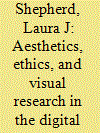

|
|
|
|
|
| Summary/Abstract |
Fifteen years ago, Roland Bleiker’s profound and influential article outlined a research agenda for those who take seriously the nature of aesthetic encounters with the social world. A rich and sophisticated literature addressing theoretical and methodological aspects of visual research in IR has emerged through the ‘aesthetic turn’ in International Relations (IR) theory.1 Efforts to theorise, or represent, global politics that are inspired by an aesthetic approach do not seek to produce the ‘most accurate’ theory or representation. ‘Approaching the study of IR with an aesthetic sensibility encourages scholars to pay analytical attention to affect rather than reason, judgement rather than fact, sensation rather than intellectualism’.
|
|
|
|
|
|
|
|
|
|
|
|
|
|
|
|
| 2 |
ID:
130964
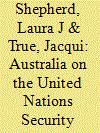

|
|
|
|
|
| Publication |
2014.
|
| Summary/Abstract |
Until 2015, Australia is uniquely positioned on the world stage to make a real difference to women's lives in conflict, transitional and post-conflict countries by ensuring they are actively represented in all peace negotiations1. The Australian government has secured not only a non-permanent seat on the United Nations Security Council (UNSC), but also a seat on the Executive Board of UN Women, the UN entity charged with enhancing gender equality and the empowerment of women. These represent two internationally significant avenues through which the Australian government can fulfil its promise to engage women in the governance of international peace and security, furthering the UN's Women, Peace and Security (WPS) agenda. This agenda, the primary architecture of which comprises seven interrelated UNSC Resolutions dating back to UNSC Resolution 1325 (2000), mandates that women should be represented at and actively participate in all peace negotiations, as well as making binding international commitments to eliminate violence against women and protect women's rights
|
|
|
|
|
|
|
|
|
|
|
|
|
|
|
|
| 3 |
ID:
173395
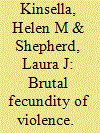

|
|
|
|
|
| Summary/Abstract |
This article highlights Marysia Zalewski's scholarship as reflective and generative of the multifarious sources and contributions of feminist IR and its ‘scavenger methodologies’, which seek to centre subjects, processes, and practices historically excluded, ignored, and minimised. The productive depth of her scholarship is evident in the uniqueness of each article in this collection, all of which distinctly document the uses to which Zalewski's writings can be uniquely put. Each of the articles performs a ‘turning operation’ of sorts on the elementals of feminist IR (gender/women/power/difference) and brings further elaborations of masculinities, sexualities, silences as well as screams, that shift and change what is taken to be feminist research/method – at each point disordering our sensibilities and our assumptions as to what we do when we do feminist work.
|
|
|
|
|
|
|
|
|
|
|
|
|
|
|
|
| 4 |
ID:
139988


|
|
|
|
|
| Summary/Abstract |
Australia was the first United Nations member state to commit to the United Nations Peacebuilding Fund when it was established in 2006, and it has made annual contributions since then. Australia has also made significant contributions towards enhancing gender equality in peace and security governance, most recently during its 2013–14 term of office on the United Nations Security Council, recognising that gender matters in and to all aspects of peacebuilding activity. This article offers a discourse-theoretical policy analysis of a range of Australian Agency for International Development guidelines and strategies addressing gender and peacebuilding issues, and reads these against the international framework to explore the discursive construction of gender-sensitive peacebuilding in Australia. The authors argue that the representations of peacebuilding in the documents they analyse shape how Australia engages in peacebuilding-related activities and inform how Australia is positioned internationally as a peacebuilding actor.
|
|
|
|
|
|
|
|
|
|
|
|
|
|
|
|
| 5 |
ID:
175555
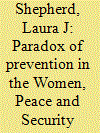

|
|
|
|
|
| Summary/Abstract |
Prevention is a central pillar of the ‘Women, Peace and Security’ agenda, a policy architecture governing gender and conflict that is anchored in a suite of United Nations Security Council resolutions adopted under the title of ‘Women and Peace and Security’. In this article, I argue that prevention is currently constituted within the WPS agenda in multiple ways, all of which are organised in accordance with different logics: a logic of peace; a logic of militarism; and a logic of security. This presents prevention as a paradox, because in operation it collapses back into a logic of security, even as it is constructed and positioned as security's temporal and conceptual other. I provide a close reading of the WPS resolutions and show how the articulations of prevention across the agenda, and in certain resolutions, operate according to logics of security and militarism. The significance of such an argument is twofold: it lies both in the possibility of reconstruction of prevention in the WPS agenda according to different logics, and in the potential of undoing security – as the manifestation of prevention in practice – in queer, feminist, decolonial, and posthuman ways of knowing and encountering the world.
|
|
|
|
|
|
|
|
|
|
|
|
|
|
|
|
| 6 |
ID:
082469
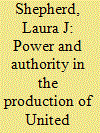

|
|
|
|
|
| Publication |
2008.
|
| Summary/Abstract |
United Nations Security Council Resolution (UNSCR) 1325 was adopted in 2000 with the aim of ensuring all efforts toward peacebuilding and post-conflict reconstruction, as well as the conduct of armed conflict itself, would entail sensitivity toward gendered violence and gendered inequalities. In this article, I contrast two accounts of the writing of UNSCR 1325 that issue from the two institutions that claim authority over the document: the United Nations Security Council and the NGO Working Group on Women, Peace and Security. I make a broader theoretical argument about the importance of paying analytical attention to the discursive terrain of international institutions when analyzing the formulation and implementation of security policy, concluding that contemporary theorizing of international institutions is product/productive of a particular configuration of political authority and legitimacy that can, and should, be challenged
|
|
|
|
|
|
|
|
|
|
|
|
|
|
|
|
| 7 |
ID:
145272


|
|
|
| 8 |
ID:
126699


|
|
|
|
|
| Publication |
2013.
|
| Summary/Abstract |
This forum comprises seven pieces conceived in response to the recent Politics & Gender Critical Perspectives section, titled "The State of Feminist Security Studies: A Conversation" (P&G , Vol. 7, Issue 4). Throughout, we refer to this collection as "the CP section." We are pleased to take this opportunity to continue the conversation begun in the CP section and to offer sympathetic yet critically engaged contributions in response to the original collection of essays. We hope that this forum indicates the (geographical, cultural, theoretical) diversity of feminist security studies and its multivocality, as well as providing an overview, for those not familiar with the literature, of the issues and debates currently enlivening the field.
|
|
|
|
|
|
|
|
|
|
|
|
|
|
|
|
| 9 |
ID:
086148
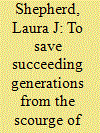

|
|
|
|
|
| Publication |
2008.
|
| Summary/Abstract |
This investigation explores the ways in which discourses of security functioned to allow military intervention in Iraq to become 'thinkable', and how these actions serve to reconfigure not only the identities of states - the US and Iraq - but also the characteristics of the international as a spatial and conceptual domain. In the weeks preceding the military intervention in Iraq, significant negotiations were conducted between the US government and the UN that were commented on extensively in press statements and other documents released by both parties. Drawing on UNSC Resolutions, public debates and academic analyses, in this article I analyse the relations between the US and the UN in the build-up to the Iraq war, making two related claims.
First, I argue that each discourse is organised around a particular logic of security. By 'logics of security', I mean the ways in which various concepts are organised within specific discourses of security. That is, each competing conceptualisation of security has a distinct primary focus, referent object and perspective on the arrangement of the international system. The ways in which these claims are made, the assumptions that inform them, and the policy prescriptions that issue from them, are what I refer to as 'logics of security'. Second, I argue that the intervention in Iraq, a violence undertaken in the name of 'security', has functioned to reproduce the international as a spatial and conceptual domain according to the logic of a highly conventional narrative of sovereigneity, and, ultimately, of state identity.
|
|
|
|
|
|
|
|
|
|
|
|
|
|
|
|
| 10 |
ID:
152338
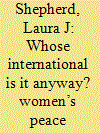

|
|
|
|
|
| Summary/Abstract |
This essay draws on insights from feminist scholarship to complicate the image presented of International Relations theory in Justin Rosenberg’s article ‘International Relations in the Prison of Political Science’. I suggest that Rosenberg’s careful and persuasive analysis proceeds from a number of assumptions about where ‘IR theory’ resides intellectually, and in whose bodies ‘IR theory expertise’ accrues.
|
|
|
|
|
|
|
|
|
|
|
|
|
|
|
|
| 11 |
ID:
130965
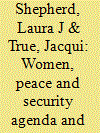

|
|
|
|
|
| Publication |
2014.
|
| Summary/Abstract |
What is the 'Women, Peace and Security agenda' and why is it relevant now for Australia? During 2013-14, Australia is a non-permanent member of the United Nations Security Council and, with a growing foreign military, peacebuilding and aid presence around the world, the country must play a role in preventing conflict, in protecting women and girls from violence before, during and after conflict, and in encouraging the participation of women in these peace and security decisions in order to create the structural, gender-equal conditions for lasting peace. This article highlights the promises made by Australia during the campaign for the Security Council seat. It evaluates the credibility of the campaign commitments by assessing Australia's foreign policies and overseas aid spending on women and peacebuilding in Asia and the Pacific; exploring the avenues for government-funded research on women, peace and security issues to influence government policies and programs; and taking stock of the government's record of engaging with civil society in developing and carrying out its National Action Plan on Women, Peace and Security. The article suggests concrete actions that would allow Australia to fulfil its promises and progress its international leadership on the major pillars of the Women, Peace and Security agenda.
|
|
|
|
|
|
|
|
|
|
|
|
|
|
|
|
|
|
|
|
|